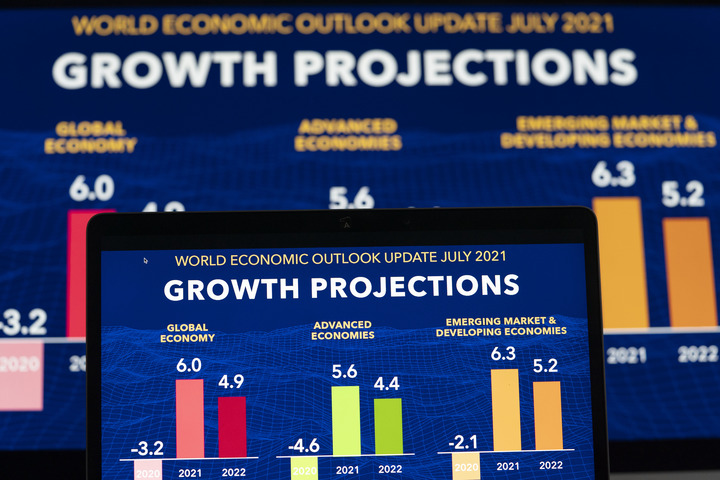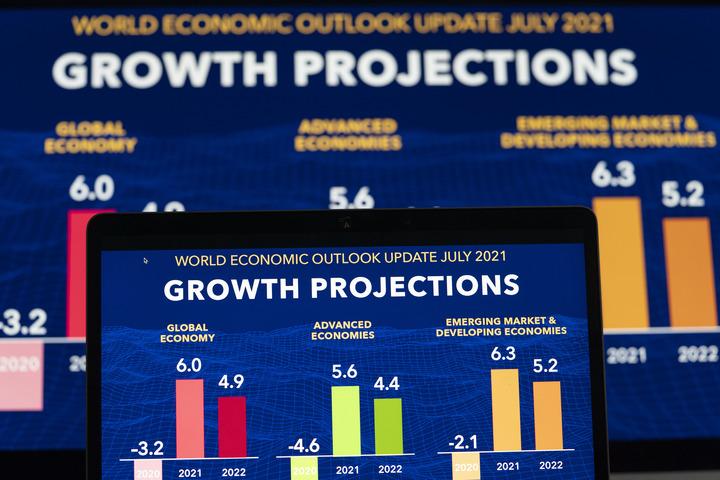BEIJING, April 20 (Xinhua) -- Despite daunting challenges and risks, China's gross domestic product (GDP) grew 4.8 percent in the first quarter of this year, and thus many international agencies are sanguine about China's growth outlook.
China set its economic growth rate target for this year at 5.5 percent earlier. However, the whole world has confronted with a string of challenges since March, such as soaring price of energy, fertilizer and grain due to the Russia-Ukraine conflict and exacerbated effects of the COVID-19 pandemic.

Photo taken in Arlington, Virginia, the United States, on July 27, 2021 shows screens displaying charts of growth projections updated by the International Monetary Fund (IMF).
(Xinhua/Liu Jie)
As a result, many international organizations lowered the global growth forecasts as well as revised China's growth forecasts.
Martin Raiser, World Bank country director for China, told Xinhua that forcast update was made amid the combined shocks of conflicts in Ukraine, the sluggish growth of developed economies, as well as resurgence of the Omicron variant.
Managing Director of the International Monetary Fund (IMF), Kristalina Georgieva, said in a speech that the impact of the Russia-Ukraine conflict would contribute to forecast downgrades for 143 economies this year -- accounting for 86 percent of global GDP.
Meanwhile, these international agencies also expressed their confidence in China's long-term economic growth featuring great potential, strong resilience and huge market with ample space.
Yi David Wang, chief China economist at Credit Suisse Group AG, expected that China's GDP to grow 5.3 percent as the country posted better-than-expected performance in fixed-asset investment and manufacturing industry in the first quarter.
Director of the Economic Department of the ADB China Representative Office Pei Deming said that there are positive signs in the midst of negative factors, such as accelerated infrastructure investment, steady growth of exports and better-than-expected loan growth. Pei believes that China still has many policy tools for fiscal and monetary policies.
Faced with new challenges, China has rolled out timely measures to ease burdens on market entities, relieve cash strain faced by enterprises and spur market vitality.
Pei added that the prompt actions to counter the downward pressure are of great importance as the pandemic remains as the major risk in China.
Georgieva noted that the IMF supports China's efforts to save the pandemic-stricken economy, such as crisis response, liquidity supply, fiscal policies and financial supports.
In tandem with stabilizing the economic growth, China should also dedicate to adjusting economic structure, which will be essential to the country's long-term and sustainable growth, Raiser observed.
China has been successful in pushing forward economic restructuring, especially in its industrial sector, making digital economy a new growth engine, according to a recent report by the United Nations Conference on Trade and Development (UNCTAD).

A staff member displays a 5G+AI filming technology at the China International Digital Economy Expo 2021 in Shijiazhuang, north China's Hebei Province, Sept. 7, 2021. (Xinhua/Wang Xiao)
The report said that China, a staunch supporter of globalization, has become an important player in global supply chain and value chain.
Despite rising wages compared with its competitors, China's industrial chain still has outstanding edges, said Raiser, adding that over time, China will move out of the lower-skilled segment.
Apart from the upgrade of industrial chain, the huge potential of China's consumption market is also a key reason why the country is a strong "magnet" for global investments, according to Raiser.
China's strong foreign trade in the first quarter mirrored Raiser's observation. Total value of the country's imports and exports grew 10.7 percent year on year during the period and foreign direct investment (FDI) into the Chinese mainland, in actual use, surged by 25.6 percent.
Raiser expected that foreign companies are to remain in China, an irreplaceable market.
(Edited by Li Shimeng with Xinhua Silk Road, lishimeng@xinhua.org)




 A single purchase
A single purchase









